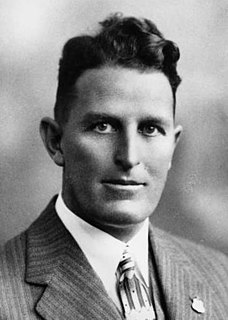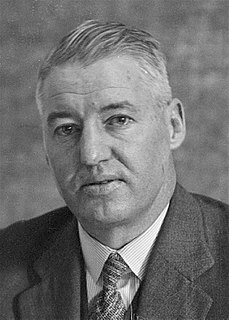Elections were held in the state of Western Australia on 21 October 1914 to elect 50 members to the Western Australian Legislative Assembly. The Labor party, led by Premier John Scaddan, retained government against the opposition conservative Liberal Party led by Opposition Leader Frank Wilson, though with only the barest of majorities. The election also saw the emergence of the Western Australian Country Party, which had been formed at a conference of the Farmers and Settlers Association the previous year to fight for rural interests, and won eight seats at the election.

Elections were held in the state of Western Australia on 7 April 1956 to elect all 50 members to the Legislative Assembly. The Labor Party, led by Premier Albert Hawke, won a second term in office against the Liberal-Country coalition, led by Sir Ross McLarty.

Elections were held in the state of Western Australia on 14 February 1953 to elect all 50 members to the Legislative Assembly. The two-term Liberal-Country Party coalition government, led by Premier Sir Ross McLarty, was defeated by the Labor Party, led by Opposition Leader Albert Hawke.

Elections were held in the state of Western Australia on 25 March 1950 to elect all 50 members to the Legislative Assembly. The Liberal-Country coalition government, led by Premier Ross McLarty, won a second term in office against the Labor Party, led by Opposition Leader Frank Wise.

Elections were held in the Australian state of Queensland on 11 June 1932 to elect the 62 members of the state's Legislative Assembly.

Elections were held in the Australian state of Queensland on 15 April 1944 to elect the 62 members of the state's Legislative Assembly.

Elections were held in the Australian state of Queensland on 11 May 1935 to elect the 62 members of the state's Legislative Assembly. The Labor government of Premier William Forgan Smith was seeking a second term after having defeated the Country and Progressive National Party in the 1932 election.

Elections were held in the Australian state of Queensland on 2 April 1938 to elect the 62 members of the state's Legislative Assembly. The Labor government of Premier William Forgan Smith was seeking a third term in office. During the previous term, the Country and United Australia parties had emerged from the united Country and Progressive National Party, which had represented conservative forces for over a decade.

Elections were held in the Australian state of Queensland on 29 March 1941 to elect the 62 members of the state's Legislative Assembly. The Labor government of Premier William Forgan Smith was seeking a fourth term in office.

Elections were held in the Australian state of Queensland on 29 April 1950 to elect the 75 members of the state's Legislative Assembly. The Labor government was seeking its seventh continuous term in office since the 1932 election; it would be Premier Ned Hanlon's second election.

Elections were held in the Australian state of Queensland on 11 May 1929 to elect the 72 members of the state's Legislative Assembly. In this election, Irene Longman became the first woman to both stand and be elected into the Queensland Parliament.

The Gair Ministry was a ministry of the Government of Queensland and was led by Labor Premier Vince Gair. It succeeded the Hanlon Ministry on 17 January 1952 following Ned Hanlon's death two days earlier. On 26 April 1957, Gair and most of the Ministry were expelled from the Labor Party and formed the Queensland Labor Party (QLP), retaining the ministry but losing the confidence of the Assembly. The ministry was followed by the Nicklin Ministry on 12 August 1957 following the defeat of both Labor and the QLP at the resulting election.

Elections were held in the Australian state of Queensland on 22 May 1915 to elect the 72 members of the state's Legislative Assembly.

Elections were held in the Australian state of Queensland on 19 May 1956 to elect the 75 members of the state's Legislative Assembly. The Labor government was seeking its ninth continuous term in office since the 1932 election; it would be Vince Gair's second election as Premier.

Elections were held in the Australian state of Queensland on 3 August 1957 to elect the 75 members of the state's Legislative Assembly. The major parties contesting the election were the Queensland Labor Party led by Premier Vince Gair, the Labor Party led by former Deputy Premier Jack Duggan, and the Country-Liberal coalition led by Frank Nicklin.

Elections were held in the Australian state of Queensland on 12 May 1923 to elect the 72 members of the state's Legislative Assembly. The Labor government was seeking its fourth continuous term in office since the 1915 election; it would be Premier Ted Theodore's second election.

Elections were held in the Australian state of Queensland on 28 May 1960 to elect the 78 members of the state's Legislative Assembly. The election followed the enactment of the Electoral Districts Act 1958 which increased the Assembly from 75 to 78 seats and modified the zonal system first established by Labor ahead of the 1950 election.
Elections were held in the Australian state of Queensland on 18 May 1907 to elect the 72 members of the state's Legislative Assembly. The election was the first one in which women had a right to vote.
Elections were held in the Australian state of Queensland on 5 February 1908 to elect the 72 members of the state's Legislative Assembly.

Elections were held in the Australian state of Queensland on 9 October 1920 to elect the 72 members of the state's Legislative Assembly. The Labor government was seeking its third term in office since the 1915 election. It was Premier Ted Theodore's first election.















